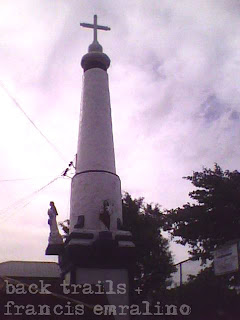The town of Lumban lies at the foot of the mountain ranges that stretch on the eastern side of Laguna. Lumban derives its name from a tree called lumbang. But I am yet to see for myself a tree called by that name.
Lumban also experienced division into different towns we now know as Sta. Cruz, Cavinti, and Pagsanjan. If you decide to continue traveling to the neighboring town of Paete, you’ll notice that a large part of Lumban is still open land for planting. Online reading informed me that two barangays – Kulyon and Binayuyo – are uninhabited. I wonder what can be found in these parts.
The town is also famous for its embroidered products primarily jusi and piña. To showcase the town’s prime products, they are holding an annual activity called Burdang Festival. They have rightfully earned the title Embroidery Capital of the Philippines.
Lumban Church
Lumban was once the heart of all missionary activities of the friars in the province. In 1578 Reverend Juan de Plasencia O.F.M. ministered in the town. The first church built there was only thatched and wooden. It was later destroyed by fire. Reconstruction of the town church marked the construction of the first stone church to be built in Laguna in 1600. On October 9, 1600 a Eucharistic procession was held. But earthquakes during the year 1880 brought much damage to the church.
From 1606 to 1618 a rest house was kept there to house the sick Franciscan missionaries. Also in 1606, a regional school for boys was put up by Reverend Juan de Santa Maria. About 400 boys were taught there liturgical hymns as well as use of several musical instruments.
Places Yet to be Visited
Lake Caliraya, for one. I was earlier confused about this lake for I thought it is found in Cavinti, Laguna. I have once visited the Japanese Garden there and I hope to share it here next time. There is also the Talahib Falls although I am yet to find out how to get there.
Lumban also experienced division into different towns we now know as Sta. Cruz, Cavinti, and Pagsanjan. If you decide to continue traveling to the neighboring town of Paete, you’ll notice that a large part of Lumban is still open land for planting. Online reading informed me that two barangays – Kulyon and Binayuyo – are uninhabited. I wonder what can be found in these parts.
The town is also famous for its embroidered products primarily jusi and piña. To showcase the town’s prime products, they are holding an annual activity called Burdang Festival. They have rightfully earned the title Embroidery Capital of the Philippines.
Lumban Church
Lumban was once the heart of all missionary activities of the friars in the province. In 1578 Reverend Juan de Plasencia O.F.M. ministered in the town. The first church built there was only thatched and wooden. It was later destroyed by fire. Reconstruction of the town church marked the construction of the first stone church to be built in Laguna in 1600. On October 9, 1600 a Eucharistic procession was held. But earthquakes during the year 1880 brought much damage to the church.
From 1606 to 1618 a rest house was kept there to house the sick Franciscan missionaries. Also in 1606, a regional school for boys was put up by Reverend Juan de Santa Maria. About 400 boys were taught there liturgical hymns as well as use of several musical instruments.
Places Yet to be Visited
Lake Caliraya, for one. I was earlier confused about this lake for I thought it is found in Cavinti, Laguna. I have once visited the Japanese Garden there and I hope to share it here next time. There is also the Talahib Falls although I am yet to find out how to get there.








No comments:
Post a Comment